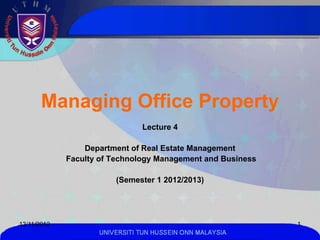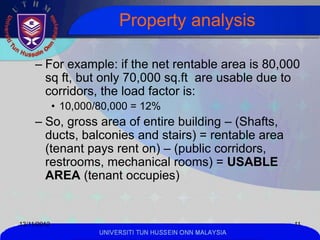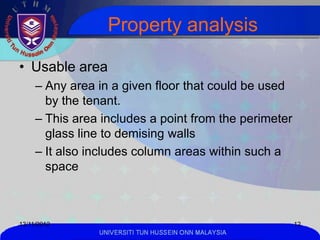Managing Office Property
- 1. Managing Office Property Lecture 4 Department of Real Estate Management Faculty of Technology Management and Business (Semester 1 2012/2013) 13/11/2012 1 UNIVERSITI TUN HUSSEIN ONN MALAYSIA
- 2. Introduction • An office building can be defined as a property that provides facilities (space) to a tenant engaged in services rather than a location where goods are sold (shopping centre) or manufactured (industrial building) 13/11/2012 2 UNIVERSITI TUN HUSSEIN ONN MALAYSIA
- 3. Supply and Demand • Developers build office space based on two types of demand – Space-created demand – Money created demand 13/11/2012 3 UNIVERSITI TUN HUSSEIN ONN MALAYSIA
- 4. Desirability •Decarlo (1997) categorised office desirability into four grades: GRADE LOCATION RENTAL RATE TENANTS A Best Highest Most Prestigious B Second Slightly less than A Good, Solid Best C Older area Below A & B Lower income D Near CBD Lowest Not usually maintained Location Desirability 13/11/2012 4 UNIVERSITI TUN HUSSEIN ONN MALAYSIA
- 5. Desirability • Why are some office buildings at full occupancy with high rental rates while others are half empty at bargain-basement rents? – The answer is ‘desirability’ 13/11/2012 5 UNIVERSITI TUN HUSSEIN ONN MALAYSIA
- 6. Desirability • The grades are achieved by ranking 12 criteria: – Location – Elevators – Neighbourhood – Corridors – Transportation – Office interiors – Prestige of – Management building – Tenant mix – Appearance – Tenant service – Lobby 13/11/2012 6 UNIVERSITI TUN HUSSEIN ONN MALAYSIA
- 7. Market analysis • Regional analysis – Reflect availability or scarcity • Neighbourhood analysis – Prestige of the local area, transportation, parking and proximity to business and services • Absorption rate – The no of sq feet that have been historically been leased in the market area. 13/11/2012 7 UNIVERSITI TUN HUSSEIN ONN MALAYSIA
- 8. Market analysis . • Site selection – 4 key factors influencing the selection of office facilities (Kyle, 2000) • Cost • Accessibility • Environment • Labour market 13/11/2012 8 UNIVERSITI TUN HUSSEIN ONN MALAYSIA
- 9. Property Analysis • Measuring the building – Gross area of entire building • The total sum of the areas of each floor including lobbies and corridors within the outside faces of the exterior walls – Gross rentable area • All areas within the outside walls, less pipe shafts, vertical ducts, elevator shafts, balconies and stairs – Net rentable area • Total sum of gross rentable area – (public corridors, washrooms, janitorial and electrical closets, air-conditioning rooms and other rooms or areas not available to the tenant and the tenant’s employees 13/11/2012 9 UNIVERSITI TUN HUSSEIN ONN MALAYSIA
- 10. Property analysis • The property manager should be sure that figures are accurate and truthful to avoid confusion and lawsuit. • In describing the space, the lease document should contain language such as ‘suite 300’, which approximately 3,000 square feet’. • As a rule of thumb, the higher the loss or ‘load factor’ (unusable space), the lower the rent, because the tenant receives less usable space. 13/11/2012 10 UNIVERSITI TUN HUSSEIN ONN MALAYSIA
- 11. Property analysis – For example: if the net rentable area is 80,000 sq ft, but only 70,000 sq.ft are usable due to corridors, the load factor is: • 10,000/80,000 = 12% – So, gross area of entire building – (Shafts, ducts, balconies and stairs) = rentable area (tenant pays rent on) – (public corridors, restrooms, mechanical rooms) = USABLE AREA (tenant occupies) 13/11/2012 11 UNIVERSITI TUN HUSSEIN ONN MALAYSIA
- 12. Property analysis • Usable area – Any area in a given floor that could be used by the tenant. – This area includes a point from the perimeter glass line to demising walls – It also includes column areas within such a space 13/11/2012 12 UNIVERSITI TUN HUSSEIN ONN MALAYSIA
- 13. Setting the rent schedule • Factors to consider: – 12 criteria for ranking the building – Additional amenities – General economic conditions – Owner’s break-even point 13/11/2012 13 UNIVERSITI TUN HUSSEIN ONN MALAYSIA
- 14. Setting the rent schedule • Example from the market survey – If the rent is RM4,000 permonth on 2,500 sq. ft of space, • the quoted rate = RM1.60 psf permonth or RM19.20 psf perannum. 13/11/2012 14 UNIVERSITI TUN HUSSEIN ONN MALAYSIA
- 15. Setting the rent schedule • Example from Break-even Analysis – A break even analysis determines the min rent needed to pay all of the building’s expenses and costs, as well as the owner’s expected return. – the formula: • B/E rent = (expenses + mortgage + return) rentable area of building in sq.ft. 13/11/2012 15 UNIVERSITI TUN HUSSEIN ONN MALAYSIA
- 16. Setting the rent schedule • For example: – Rentable space = 50,000 sf – Expenses = RM291,258 – Owner’s equity = RM1,000,000 – Owner’s rate of return = 10% = RM100,000 – Mortgage payment = RM568,742 – Mortgage = RM4,500,000 13/11/2012 16 UNIVERSITI TUN HUSSEIN ONN MALAYSIA
- 17. Setting the rent schedule • Therefore: – B/E rent = (RM291,258 + RM568,742 + RM100,000 50,000 sqft = RM960,000 50,000 sq.ft = RM19.20 sq.ft per annum • so the min rent charged is RM19.20 sq.ft per annum or RM 1.60 sq.ft permonth to cover all of the building’s expenses, costs and the owners’ return 13/11/2012 17 UNIVERSITI TUN HUSSEIN ONN MALAYSIA
- 18. Tenant selection • Major tenants • Small tenants • Attracting tenants – Newspaper adverisments • Direct mail • Publicity • Signage • Brochures • Miscellaneous media 13/11/2012 18 UNIVERSITI TUN HUSSEIN ONN MALAYSIA
- 19. Leasing consideration • On-site vs off-site • Property management vs leasing agents • Small vs large leasing firms 13/11/2012 19 UNIVERSITI TUN HUSSEIN ONN MALAYSIA
- 20. Leasing techniques • Cold-calling • Space planner • Existing tenants • High status tenants • Comparison of buildings 13/11/2012 20 UNIVERSITI TUN HUSSEIN ONN MALAYSIA
- 21. Maintenance • Smart (intelligent building) – 5 classifications of smart buildings • Level zero – has no intelligent amenities and does not qualify. • Level one – provides infrastructure core • Level two – provides level one capabilities + conference space, photocopying and business centre • level three – provides level two capabilities + telecommunication services utilizing building cabling system • Level four – provides level three capabilities + sophisticated office automation and ICT. 13/11/2012 21 UNIVERSITI TUN HUSSEIN ONN MALAYSIA
- 22. References • Decarlo (1997), Property Management, Thomson. • Kyle, R, (2000), Property Management, 6th Edition, Dearborn. 13/11/2012 22 UNIVERSITI TUN HUSSEIN ONN MALAYSIA






















